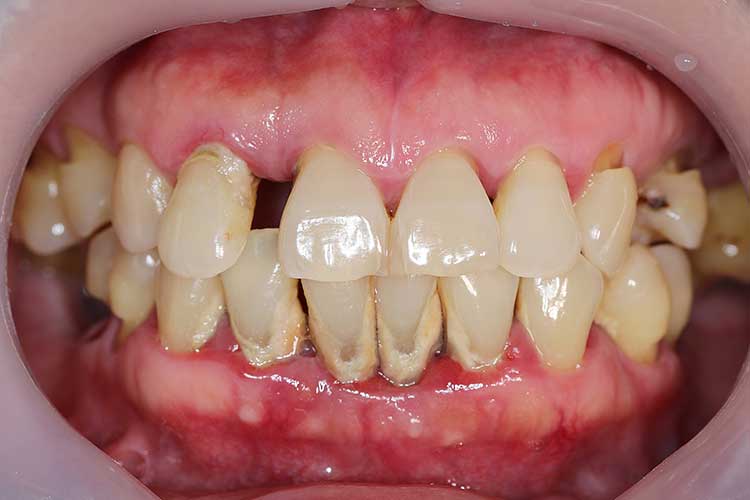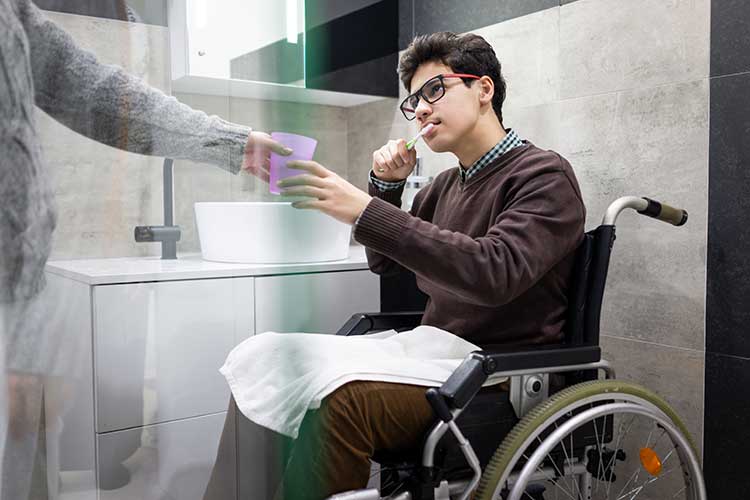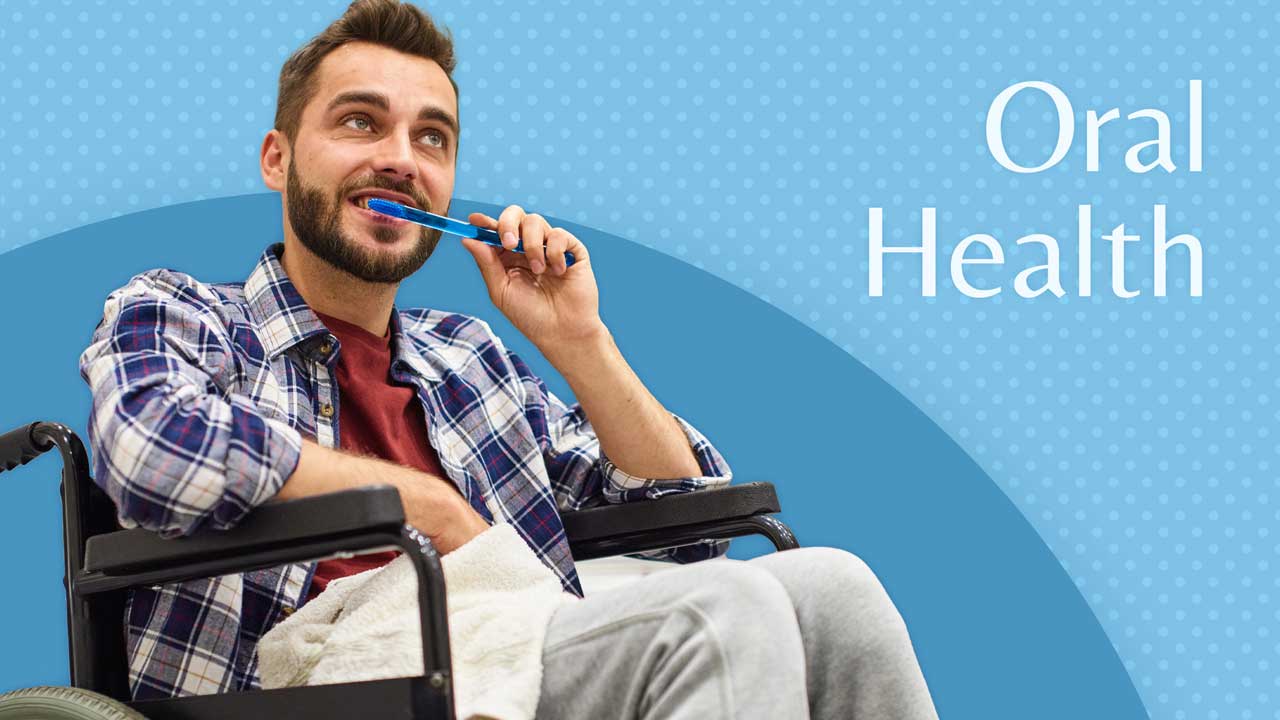Oral health is central to a person’s quality of life, health and wellbeing (AIHW 2024a).
If not properly maintained, it can lead to various adverse health outcomes, ranging from tooth decay to stroke and cardiovascular disease (AIHW 2024a).
Sadly, people living with disability are at an increased risk of poor oral health - despite it being largely preventable (AIHW 2024a; WHO 2025).
What is Oral Health?
Oral health can be defined as ‘the ability to eat, speak and socialise without discomfort or active disease in the teeth, mouth or gums’ (AIHW 2024b).
Oral health comprises:
- Lips
- Tongue
- Gums and tissues
- Saliva
- Natural teeth
- Dentures
- Oral cleanliness
- Dental pain.
(SA Dental 2023)
Consequences of Poor Oral Health

Poor oral health can lead to numerous detrimental health effects in people living with disability, including:
- Heavy tooth wear due to tooth grinding
- Tooth enamel defects
- Delayed eruption of teeth, or retention of baby teeth
- Mouth ulcerations
- Mouth disease and infection
- Periodontal (gum) disease and inflammation
- Tooth decay
- Loss of teeth
- Difficulty or inability to consume certain foods or drinks, which can lead to poor nutrition
- Pain and discomfort, which can be particularly distressing and frustrating for people with existing communication difficulties
- Dysphagia (swallowing difficulties)
- Infection or aspiration if food remains in the mouth after a meal
- Sleeping issues
- Speaking difficulties
- Embarrassment due to the appearance of their teeth, causing them to avoid interaction with others or socially withdraw
- Irritation or distress
- Poor psychological and emotional wellbeing
- Exacerbation of existing health conditions due to poor nutrition
- Chronic conditions, including stroke and cardiovascular disease.
(Angwin et al. 2015; ACSQHC & NDIS Commission 2023; AIHW 2024a)
Poor Oral Health in People Living With Disability
Why are people living with disability at increased risk of poor oral health, despite most oral diseases being preventable?
- They may rely on assistance from others to maintain oral hygiene
- They are more likely to be receiving enteral feeding than the general population
- There may be challenges related to communication or behaviour, e.g. anxiety or reluctance to cooperate with oral care procedures
- They may experience drooling, gagging or swallowing problems that make oral hygiene more difficult to perform
- They might perform oral habits such as teeth grinding, food pouching, mouth breathing and tongue thrusting
- They may be on a soft diet, which increases the risk of food remaining in the mouth after eating and causing disease or infection
- Certain medicines for chronic illnesses (e.g. analgesics, muscle relaxants, asthma medicine, antidepressants) can cause xerostomia (dry mouth), which increases the risk of tooth decay
- They may have a malocclusion (misalignment of teeth), which can make speaking or chewing more difficult, as well as increase the risk of oral disease or trauma
- Gastroesophageal reflux, which can occur in central nervous system disorders like cerebral palsy, can cause tooth sensitivity or erosion
- They may experience seizures, during which they might chip teeth or bite their tongue or cheeks
- There may be a lack of availability of dental health professionals with the appropriate skills to perform oral care
- They may have difficulty physically accessing dental clinics (e.g. due to mobility impairment)
- They may be unable to afford the cost of dental treatment if they also need to pay for specialised care related to their disability.
(Wilson et al. 2019; NIDCR 2023; Angwin et al. 2015; ACSQHC & NDIS Commission 2023; AIHW 2024a)/small>
Addressing Oral Health in People Living With Disability

Taking care of the entire mouth is essential in maintaining oral health. This should comprise:
- Regular dental checkups
- Brushing teeth
- Flossing
- Removing leftover food from the mouth after eating
- Maintaining good nutrition and adequate hydration
- Reducing sugar intake
- Reducing alcohol consumption
- Quitting smoking.
(ACSQHC & NDIS Commission 2023)
You can support people with disability to maintain good oral hygiene by:
- Asking if they have any worries or pain in relation to their oral health
- Ensuring that oral hygiene and regular dental checkups are included in support planning
- Being aware of behavioural changes that could indicate oral pain or discomfort
- Supporting them to attend regular dental checkups at least annually
- Providing information about oral hygiene in their preferred form
- Documenting all oral health changes, dental health assessments and recommendations made
- Assisting in daily oral care
- Ensuring they have all required equipment for oral hygiene (toothbrush, dental floss, fluoride toothpaste etc.)
- Referring to other healthcare professionals if necessary - these might include:
- Speech pathologists if the person is gagging when brushing their teeth, having difficulty clearing food from their mouth after eating, having difficulting swallowing or eating certain foods, drooling, or has a weak or absent cough
- Occupational therapists to assist with handling a toothbrush, flossing and using dental cleaning aids
- NDIS behaviour support practitioners to assist with strategies to manage anxiety, etc. during dental checkups.
(ACSQHC & NDIS Commission 2023)
Assisting With Oral Care
Read: Oral Health for Older Adults
When to Escalate Care
Signs that a person with disability might be experiencing poor oral health include:
- Cracks or pain in the corners of the mouth
- Sore, swollen, inflamed or coated areas on the tongue
- Red, swollen mouth
- Bad breath
- Dry oral tissue
- Thick, stringy or rope-like saliva
- Swollen, red gums
- Gums that bleed when brushed
- Loose, chipped or broken teeth
- Exposed tooth roots
- Mouth pain or tooth sensitivity
- Difficulty eating or speaking
- Behavioural changes
- Refusal to open their mouth
- Poor oral cleanliness
- Food remaining in the mouth after eating
- Chipped or broken dentures.
(SA Dental 2023)
Test Your Knowledge
Question 1 of 3
What is xerostomia?
Topics
References
- Angwin, L, Leighton, D & Despott, N 2015, Your Dental Health: A Guide for People With a Disability, Their Family Carers, Friends and Advocates, Inclusion Melbourne, viewed 21 May 2025, https://inclusionmelbourne.org.au/projects/your-dental-health/
- Australian Commission on Safety and Quality in Health Care and NDIS Commission 2023, Practice Alert: Oral Health, Australian Government, viewed 21 May 2025, https://www.ndiscommission.gov.au/sites/default/files/2023-02/Oral%20Health%20Practice%20Alert%20Update%202023.pdf
- Australian Institute of Health and Welfare 2024a, Older Australians: Health – Selected Conditions, Australian Government, viewed 21 May 2025, https://www.aihw.gov.au/reports/older-people/older-australia-at-a-glance/contents/health-and-functioning/health-and-disability-status
- Australian Institute of Health and Welfare 2024b, Oral Health and Dental Care in Australia, Australian Government, viewed 21 May 2025, https://www.aihw.gov.au/reports/dental-oral-health/oral-health-and-dental-care-in-australia/contents/introduction
- National Institute of Dental and Craniofacial Research 2023, Developmental Disabilities & Oral Health, National Institutes of Health, viewed 21 May 2025, https://www.nidcr.nih.gov/health-info/developmental-disabilities
- SA Dental 2023, Building Better Oral Health Communities: Better Oral Health in Home Care, Government of South Australia, viewed 21 May 2025, https://www.dental.sa.gov.au/professionals/oral-health-resources/care-for-older-people-toolkit/home-care
- Wilson, NJ, Lin, Z, Villarosa, A et al. 2019, ‘Countering the Poor Oral Health of People With Intellectual and Developmental Disability: A Scoping Literature Review’, BMC Public Health, vol. 19, no. 1530, viewed 21 May 2025, https://bmcpublichealth.biomedcentral.com/articles/10.1186/s12889-019-7863-1
- World Health Organisation 2025, Oral Health, WHO, viewed 21 May 2025, https://www.who.int/news-room/fact-sheets/detail/oral-health
 New
New 
